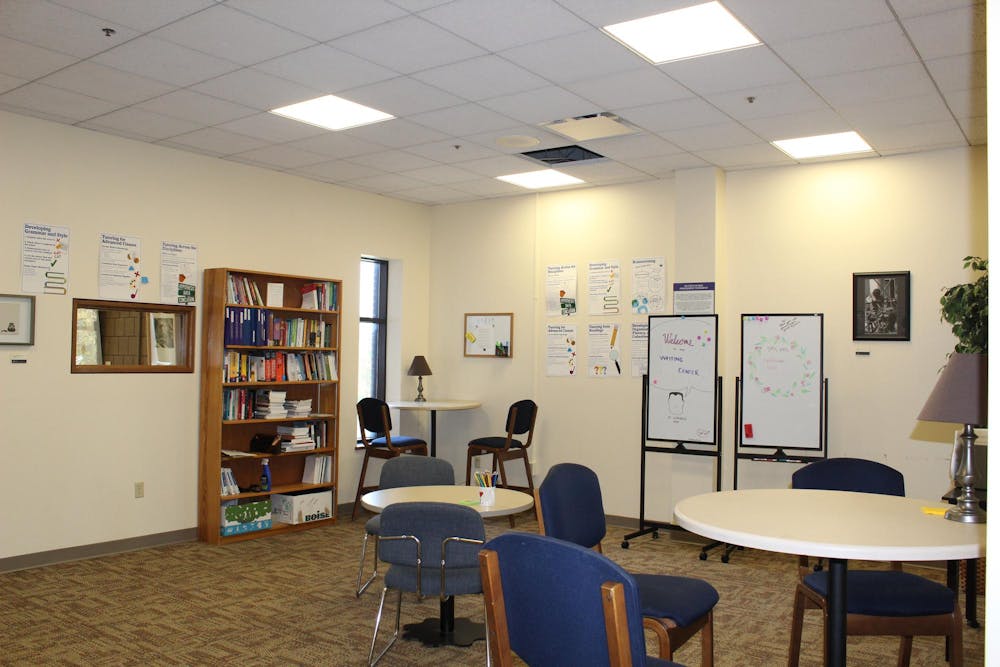When Writing Center consultants returned to campus at the end of August, the couches were missing.
So were the recliners, the coffee tables, the rugs and the posters — what had formerly been a fully-decorated corner was instead a bare room with bare walls: a blank slate.
The new decor, or lack thereof, bore witness to the unexpected leadership transition that marked the end of the previous semester.
In the spring of 2023, former associate professor of English and director of the Writing Center Julie Moore was informed that her employment contract would not be renewed for the upcoming academic year. Among other things, Moore’s abrupt transition signified an unexpected shift in leadership for the Writing Center.
After interviewing for the role in July, current director Kelli Cummings moved from South Carolina to Indiana two weeks before the start of Taylor’s fall semester. The quick turnaround, coupled with the unfamiliarity of her new roles as both director and professor, has kept Cummings on her toes.
A Master’s degree in writing (and prior work fundraising at zoos) uniquely prepared Cummings for the relational and technical aspects of her roles at Taylor. Her love for helping others develop their writing propelled her to make the vocational shift. Nevertheless, the transition has been significant — for both Cummings and the Center’s team.
Student consultant Matthew Roach was particularly struck by the physical transformation brought on by the transition; with furniture and decorations removed in the interim between Moore’s departure and Cummings’ arrival, a space that felt moved-in now seems empty.
“It was like a home in the library; it was so different from any other place in the library, and it felt like a living room to walk into,” Roach said. “So there's a lot of that fire that's gone, that I felt — and that isn't to say anything bad about our new director; it’s just what happened in the transition because it was a ginormous transition.”
In the absence of couches, Roach often chooses to sit on the floor.
The abrupt transition has also spawned other, less obvious, changes.
Ideas Moore had been working on were pushed to the back burner in her absence: plans for a mentorship program and exploration of AI involvement with the rise of ChatGPT.
“So much is restarting,” Roach said. “And (Cummings) is going to be in this difficult role of rebuilding from the ground up in terms of new ideas, of how we're going to train tutors, how we're going to tutor — everything.”
Roach voiced complete confidence in Cummings’ ability to handle these responsibilities well.
Junior consultant Joon Lee, who has worked in the Center for a little over a year, has also noticed that student consultants have been given greater responsibility than in previous years. Lee sees it as an “all hands on deck” situation.
He also notes that Cummings has been honest and open to feedback, which has made the transition smoother.
Despite the discouragement of rebuilding a formerly established space and regaining lost momentum, there is a demonstrated commitment from members of the Writing Center team to continue investing in the Center’s vision.
For Roach, this commitment looks like choosing to stay through the transition.
“I have to stay; I mean, at the beginning of the year there was a serious thing inside me that said, ‘Oh, you should quit’ (after) walking in here and it being so different,” Roach said. “But I realized I have to be present. I have to give my own ideas, as do the other tutors … So, I will carry the torch of what I've seen from Julie and from past tutors and kind of be a representation of that.”
For Cummings, this commitment means building on the Center’s core values and establishing goals that remain true to the heart of the Center’s service.
Some of these goals include reaching those who need the Center’s support most and creating a space where all feel welcome. Cummings hopes to place an emphasis on relational building and increased awareness of the Center’s services in her first few months as director.
These services include peer tutoring for all skill levels in writing, English language support and one-on-one writing discussions to help students generate ideas, navigate editing difficulties and become confident, reflective writers. Taylor students are employed and trained as qualified consultants to assist peers in the creative process.
Although consultants are available to help walk-ins, students are also able to choose their tutor of preference by scheduling an appointment ahead of time. The online appointment system can be accessed at taylor.mywconline.com.
“I feel like the Writing Center is always underestimated,” Roach said. “I know there are many students who are very capable in terms of writing. But writing is so diverse that anybody can learn how to be better … And the more you come, the better you'll get; it’s an amazing resource.”
Lee acknowledged that the first appointment can feel intimidating.
However, he encourages students to consider coming to the Writing Center — regardless of their confidence levels or where they find themselves in the creative process.
“We have several cases where people just come in and they're like, ‘Listen, I know I made an appointment, but I have nothing written down.’ That's great; we can help you brainstorm ideas and help you set goals,” Lee said. “It (can) be a little intimidating at first, but once you get there, trust me, it's not that scary and you are in control of your planning.”
The Writing Center is open Monday to Thursday from 1-5 p.m., Friday from 1-4 p.m. and Sunday to Thursday from 7-9 p.m.
More information can be found online or on the Center’s Instagram account, @tayloruwritingcenter.
“The first goal is just to let everybody know that the Writing Center is still here,” Cummings said. “It's still open.”





